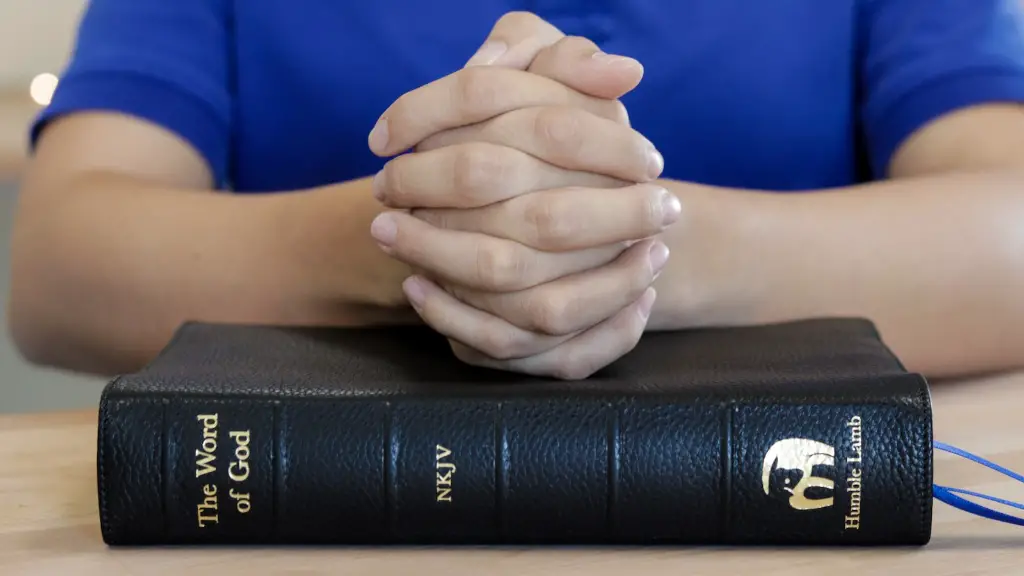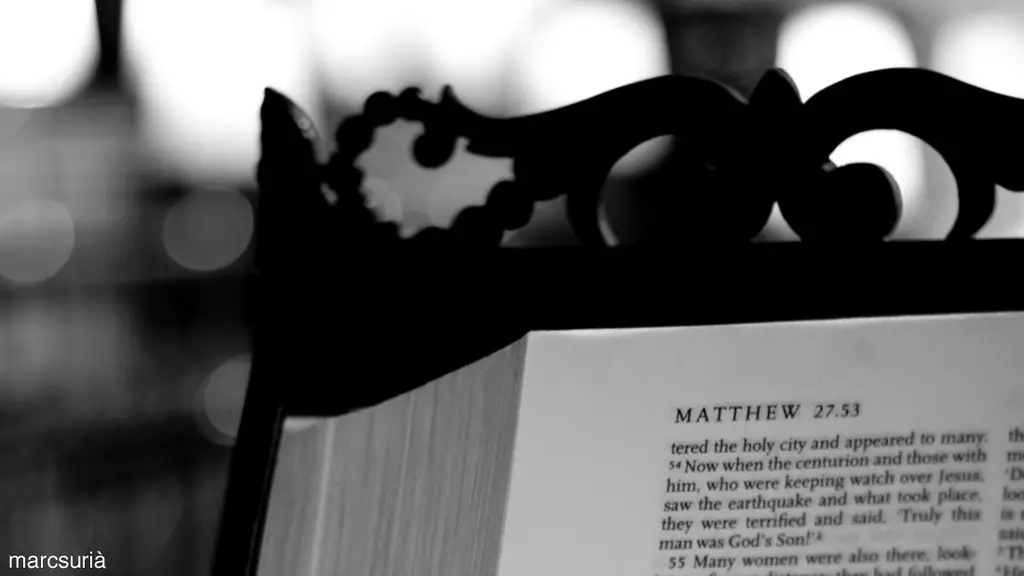Polygamy – the practice of being married to multiple spouses at the same time – is said to be supported through the Bible, however it is important to understand the context in which it is referenced. After all, the Bible is a complex and ancient book filled with complex stories and passages, and to truly explicate the nuances contained within it requires deep study, in-depth understanding and a respect for its cultural taboos.
The concept of polygamy, which is also sometimes known as polygyny, is not explicitly noted in the Bible’s New Testament though there are several veiled references to it. Rather, it is the Old Testament – principally within the Torah – that provides the clearest depiction of a familial power dynamic in which a single dominant figure is married to multiple women, traditionally in order to expand their wealth and progeny.
One example of this is found in the book of Genesis, where Jacob is said to have been given the hand of Rachel and her handmaiden Leah, though this was largely seen as a reward for his seven years of hard labor. Additionally, it is in Genesis where Abraham’s first son, Ishmael, is said to have had multiple wives of his own. Furthermore, it is known that a Pharaoh of Egypt, at the time when the children of Israel were still living there, had numerous spouses.
It is also notable that polygamy was seen as a legitimate and socially acceptable practice in the culture of ancient Judea, although it was deemed acceptable only amongst those of a certain status. This fact is affirmed through at least five different books of the Bible, which clearly suggest that this kind of lifestyle was commonplace among wealthy, powerful men.
In modern times, some theologians continue to argue that polygamy is not an inherently immoral choice. They point to the fact that polygamy is generally recognised in many parts of the world today and that there are numerous cultures which proudly embrace it as a legitimate part of their religious heritage. Eventually, whether or not it is encouraged or even allowed may depend either on personal beliefs or which sect of a specific religion is followed.
Interpretation within Ancient Culture
It is important to consider the fact that many passages within the Bible were written under a cultural context that was vastly different from the one we live in today. There are some interpretations of certain verses which could possibly indicate that polygamy is actually deemed as morally wrong within the Bible’s teachings. For instance, there are passages within the Bible which advise against polygamy, discourage it, and even directly warn against it.
When interpreting these passages, it is important for readers to take note of the context of each one and pay particular attention to the motivations of the author. For instance, some verses could suggest that polygamy is frequently associated with a lack of moral integrity while others seem to simply caution against marrying multiple partners at once due to the potential difficulties that might arise.
One example of this is found in the book of Timothy, where the Apostle Paul is seen to be stressing the importance of a monogamous partnership amongst the church’s members. Likewise, in Ephesians, there is a warning not to engage in activities such as divorcing and remarrying multiple times, as well as a reminder that each marriage is meant to be done in the name of the Lord.
In addition to these passages, it is interesting to note that many of the Bible’s stories involving polygamy were not viewed as tales of success. Rather, there are several moments where characters who pursue polygamy suffer the consequences of their choices, either in everyday life or through divine punishment.
Theology of Polygamy
Though some theologians support polygamy, many do not. Common arguments against polygamy include citing that it is at odds with marriage being denoted as a monogamous union. Or, it goes against the notion of one man being married to one woman for life and that it is more conducive to the unchecked growth of competition between wives.
When considering the spirit of the teaching, some religious leaders would argue that polygamy is largely a social problem, which needs to be dealt with through moral teaching rather than doctrinal means. For example, a religious institution such as the Church of Jesus Christ of Latter-day Saints has effectively challenged the traditional interpretation of the Bible’s teachings on this topic, as well as many other practices, such as the right of a man to take an additional wife beyond the first.
At the same time, some would point out that though polygamy was sanctioned in ancient times, the current modern world is vastly different and this change in context likely means that those same values no longer apply. This includes the fact that it is now increasingly difficult to find multiple spouses who are willing to live in the same home.
In terms of its relationship to Christianity, there are a wide range of opinions. Some sects view it as being completely wrong and cite Jesus’s words “There is no longer any Jew or Gentile, slave or free, male and female.” as sufficient evidence in their argument. However, others may look to it as a valid historical example which must be respected. Ultimately, it is important to realise that while it is mentioned in the Bible, its exact implications on the modern world may vary greatly.
Implications on Modern Associations
In the modern era, many countries place strict laws on polygamy, in addition to other laws related to women’s rights and freedom. For example, in the United Kingdom, polygamy is banned and individuals who practice it can face a jail sentences of up to seven years.
In the United States, polygamy is also not recognised as a valid marriage type and can be grounds for serious allegations depending on the state in which it is practiced. In some countries, such as Saudi Arabia, polygamy is not only accepted, but encouraged. This can lead to some troubling implications, such as fathers allocating their financial resources or favour amongst their many wives and children.
Ultimately, only after a careful and informed examination of the Bible and its teachings can one come to a conclusion about the morality and implications of polygamy. This can be a difficult task, as the Bible is so large, and the arguments for and against polygamy so varied. Many people seek to simply follow their interpretation of the scriptures, while others may wish to take a more modern approach, influenced by the current socio-economic context.
Gender Politics of Polygamy
Though polygamy may at first seem a harmless practice – as it is often seen as an expression of a powerful man’s freedom of choice – it is important to understand what sort of power dynamics it creates. Many religious theorists point out that it is possible for polygamy to become an abusive form of hierarchy, and that it can lead to oppressive conditions for women and children, who often have limited options for protection.
It is also argued that polygamy can increase risk of domestic abuse and power imbalances. It can limit personal freedom and autonomy, and in some cases, can lead to severe psychological distress. Issues such as the importance of consent, and the potential abuse of those who may not be able to protect themselves, must also be taken seriously by any society that tolerates this practice.
Furthermore, women who are married to polygamist husbands may experience a lack of financial security, as their husband is likely to allocate resources among numerous partners. Though it may not be clear whether it is wrong or right to practice polygamy, it is important to question the gender dynamics at play in such a relationship.
Impact on Children
From a modern perspective, few would claim that it is best for children to grow up in the environment of a polygamous marriage, with all the legal, economic, and psychological implications. The issue of who rightfully has authority over children within the marriage is a crucial one; furthermore, the economic, psychological, and overall family structure affects the quality of life for children.
In some cases, due to the extenuating circumstances, the children may have to deal with a complex network of parental relationships, through which they must not only be aware of all their potential siblings, but also create what could then be described as a ‘polygamous family tree’. It is crucial that the children are aware that in spite of the non-traditional family structure, they are equally loved, secure and have full protection under the law in cases of abuse.
The unfortunate reality is that even with our modern-day care and protection, children may still suffer from the effects of living in a polygamous marriage. They may struggle in school, experience marginalisation and bullying, and may even feel a lack of emotional support, security, and stability in their home environment.
Examining the Proponents for Polygamy
Despite the numerous implications that come with a polygamous marriage, the proponents of this practice argue that the choice to live this way is a valid one and is born from the free will of consenting adults. To some, it is an expression of faith and religious freedom. To others, it is simply a lifestyle that is chosen due to personal preference.
Whatever the reasons, it is important to remember that when polygamy is entered into without respect for the parties involved, then there is a great likelihood of abuse. It is up to each individual to ensure that all parties are respected, and the rights of those involved are maintained, regardless of cultural background.
In the end, it is a personal choice – and only the individuals involved can make an informed decision. While polygamy may be expressly prohibited in many countries and societies, it is ultimately left up to each individual or group to make personal choices that align with their beliefs and values.
Conclusion
Considering the different arguments for and against polygamy, it can be difficult to come to a conclusion about whether or not this practice is truly in accordance with the Bible’s teachings. Its implications for gender roles, family structures, and mental health must each be considered. Ultimately, it is up to each individual to make an educated and righteous decision that is in accordance with their beliefs and values.





